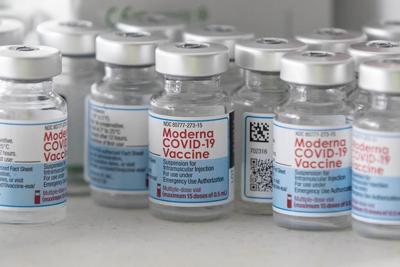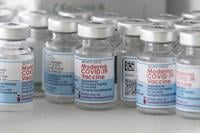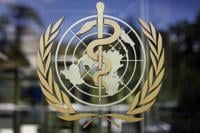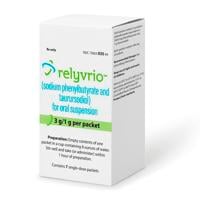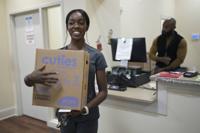OTTAWA - Canada's senior public health officials are urging Canadians to get an updated COVID-19 vaccine this fall after the first shot targeting the latest variants was authorized for use on Tuesday.
Health Canada's regulatory branch approved Moderna's new Spikevax vaccine, which is formulated for the XBB.1.5 lineage of the Omicron variant. Almost all the cases of COVID-19 in Canada currently are versions of the XBB lineage.
"There is strong evidence showing that the benefits of this vaccine outweigh the potential risks," said chief medical adviser Dr. Supriya Sharma at a news conference in Ottawa.
Moderna said in a statement the first doses would be shipped to arrive in Canada Sept. 13, with more arriving over the next month.
Moderna began submitting data on clinical trials for the new vaccine at the end of June, and the decision follows an in-depth assessment of that data, Sharma said.
Health Canada's authorizations outline who could get access to a vaccine. The Ďă¸ŰÁůşĎ˛ĘąŇĹĆ×ĘÁĎ Advisory Committee on Immunization, or NACI, provides guidance on who should get it.
NACI's latest advice is that adults and children as young as five should get one dose of the new vaccine this fall if it has been at least six months since their last dose or their most recent COVID-19 infection.
Children between six months and four years of age should get one dose if they have been vaccinated for COVID-19 before, but two doses if they haven't.
The decision comes as there has been a small uptick in COVID-19 in Canada, following months of what chief public health officer Dr. Theresa Tam said were historically low levels of the virus.
Tam said overall, that uptick has been inconsistent and sporadically located, but it is time for people to top-up their resistance to the virus.
"I think one of the reasons that we think there's an increased uptick right now is this reduced immunity over time," she said.
Ďă¸ŰÁůşĎ˛ĘąŇĹĆ×ĘÁĎly, she said there have been signs of increased positive cases and hospitalizations due to COVID-19. Levels of the virus have increased slightly in 10 of 43 cities where wastewater testing is being tracked by Health Canada.
Omicron, the variant that hit Canada just before Christmas in 2021 and caused the largest spread during the pandemic, is still the dominant variant — but there are multiple sub-lineages from it, including the XBB line. That includes XBB.1.5, for which this new vaccine is specifically formulated.
As of Sept. 3, XBB strains accounted for 98 per cent of all cases in Canada, with XBB.1.5 specifically accounting for about nine per cent, while the XBB sub-lineage EG.5 is about 35 per cent of cases.
Sharma and Tam both said the new vaccine shows good immune response against multiple XBB strains. Sharma said while the agreed-upon language internationally is to refer to this new shot as an "updated" vaccine, she is fine with also calling it a booster.
"It actually does talk about what the additional doses of the vaccine do for the immune system," she said.
Health Canada is also reviewing submissions for XBB.1.5 vaccines from Pfizer-BioNTech and Novavax. Sharma said decisions on both will be forthcoming.
The U.S. Centers for Disease Control authorized Moderna and the Pfizer/BioNTech XBB.1.5 vaccines Tuesday, recommending it for everyone at least six months old.
Moderna said doses of the vaccine should be in the hands of provinces and territories in Canada in time for their fall vaccination campaigns.
The federal government is paying for the new doses, as it has for the original vaccines and the second version, updated for an earlier Omicron strain in 2022.
Tam said some provinces may choose to roll out their COVID-19 and fall flu vaccines at the same time, and she said it is safe to get them both at the same time.
While COVID-19 vaccine doses will be covered, flu vaccines may have a cost for patients depending on the province or territory.
Canadians eagerly lined up to get the first two doses of the COVID-19 vaccine in 2021, and more than 80 per cent got those doses. However, fewer than six per cent of kids under the age of five have received the primary vaccination series, and only six per cent of Canadians have received any COVID-19 vaccination in the last six months.
This report by Ďă¸ŰÁůşĎ˛ĘąŇĹĆ×ĘÁĎ was first published Sept. 12, 2023.

